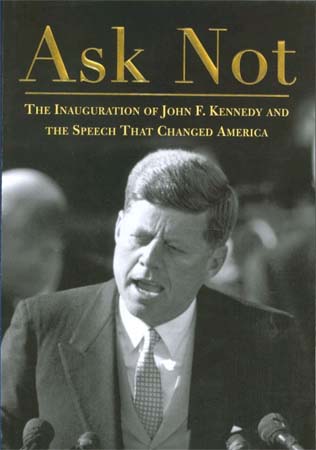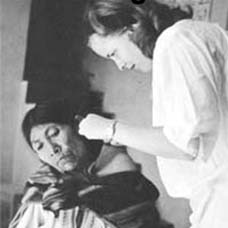January 15, 2005: Headlines: Presidents - Kennedy: Speeches: Inauguration: New York Times: Ask How by Tunisia RPCV Thurston Clarke
Peace Corps Online:
Peace Corps News:
Special Reports:
January 18, 2005: Ask Not:
January 15, 2005: Headlines: Presidents - Kennedy: Speeches: Inauguration: New York Times: Ask How by Tunisia RPCV Thurston Clarke
 | Ask Not
As our country prepares for the inauguration of a President, we remember one of the greatest speeches of the 20th century and how his words inspired us. "And so, my fellow Americans: ask not what your country can do for you--ask what you can do for your country. My fellow citizens of the world: ask not what America will do for you, but what together we can do for the freedom of man." |
Ask How by Tunisia RPCV Thurston Clarke

Ask How by Tunisia RPCV Thurston Clarke
Ask How
By THURSTON CLARKE
Published: January 15, 2005
AMERICANS watching John F. Kennedy's 1961 inauguration on television saw a scene worthy of Currier & Ives. The marble facade of the Capitol gleamed in the sun, dignitaries wore top hats and dark overcoats and the cold air turned Kennedy's breath into white clouds. When he said, "Let the word go forth from this time and place, to friend and foe alike, that the torch has been passed to a new generation," his words actually appeared to be going forth into the exhilarating air.
No one knew that Kennedy was wearing long underwear so he could remove his topcoat and appear youthful and energetic, or that he had received months of tutoring from a speech coach, or that there was so much animosity among the platform's dignitaries that if grudges had weight, the entire contraption would have collapsed. No one suspected that Cardinal Richard Cushing had slowed his invocation because he believed that smoke wafting from beneath the podium came from a smoldering bomb meant for Kennedy, and he wanted to absorb the blast himself. (It was actually a short circuit.) No one knew that as Cushing droned on, Kennedy was probably improving his address in his mind. (He would make 32 alterations to the reading copy of his inaugural address as he spoke.)
Praise for his inaugural address came from across the political spectrum - Barry Goldwater said, "God, I'd like to be able to do what that boy did there" - and was so extravagant it seems hard to believe the nation was even more divided than it is today. Kennedy had won the 1960 election with only 49.7 percent of the popular vote, yet a Gallup poll taken soon after his inauguration showed him with an approval rating of 72 percent. His own pollster, Lou Harris, put it at an astounding 92 percent. Richard Nixon, Ronald Reagan and Bill Clinton, perhaps hoping for similar ratings, have paraphrased lines from Kennedy's speech in their own inaugural addresses.
The most recent offender was George W. Bush, who in 2001 translated "Ask not what your country can do for you - ask what you can do for your country" into "What you do is as important as anything government does. I ask you to seek a common good beyond your comfort; to defend needed reforms against easy attacks; to serve your nation, beginning with your neighbor."
Kennedy's imitators have failed to appreciate that the words in his address were only part of its magic. There was also the brilliant weather, Jackie Kennedy's wardrobe, Robert Frost's poem and a president-elect who had devoted almost as much attention to his appearance as his words - darkening his tan in Palm Beach, and fussing over the cut of his suit and the arrangement of dignitaries on the platform.
They have failed to appreciate something else, something that is nearly impossible to replicate. It was Kennedy's life - and his close calls with death - that gave the speech its power and urgency. Those who study the speech would do well to pay less attention to the words and more attention to how he wrote the speech and to the relationship between its words and Kennedy's character and experience.
Kennedy composed the most memorable and poetic lines of his inaugural during a flight from Washington to Palm Beach 10 days before his inauguration. He summoned his secretary Evelyn Lincoln into his private compartment on his plane, the Caroline, and told her that he wanted to dictate some "ideas" for his inaugural.
He had in hand a draft written by his principal speechwriter, Ted Sorensen. Throughout his campaign, Kennedy had often carried a Sorensen speech to the stage only to abandon much of it in favor of his own off-the-cuff remarks. He did this again during the Palm Beach flight, and dictated several pages of his own material. It is in Evelyn Lincoln's shorthand loops and squiggles, then, that one first reads versions of "Let every nation know, whether it wishes us well or ill, that we shall pay any price, bear any burden, meet any hardship," and "Let the word go forth from this time and place, to friend and foe alike, that the torch has been passed to a new generation of Americans - born in this century, tempered by war, disciplined by a hard and bitter peace, proud of our ancient heritage."
Kennedy revised his inaugural in Palm Beach, without the assistance of the focus groups or speechwriting teams that have become de rigueur. He read it aloud to his wife, rewrote some passages on sheets of yellow legal paper and consulted with Ted Sorensen. He did not need much help revising his dictation because it was essentially autobiographical. It told his story, and that of his generation: "born in this century," "tempered by war," "disciplined by a hard and bitter peace."
Behind this structure lay five pivotal moments in his life: his travels through Europe on the eve of World War II, his experiences in the Pacific in 1943, his visit to a devastated postwar Berlin in 1945, his tour through Asia as a young congressman in 1951, and his encounter with the abject poor during the 1960 West Virginia primary. All but one of these had occurred overseas, a reminder that he was not only the most widely traveled man ever to become president, but someone who had experienced many of the defining moments of his life outside his own country.
Kennedy had a strong emotional connection with the passages inspired by his own experiences. Throughout his political career he had sometimes choked up at Memorial Day and Veterans Day ceremonies when speaking about those who had lost their lives in World War II. Among the passages he had dictated on the flight was this one: "Since this country was founded, each generation of Americans has been summoned to give testimony to its national loyalty. The graves of young Americans who answered the call to service surround the globe."
Numbered among these young Americans, of course, were his brother Joseph Kennedy Jr., his brother-in-law Billy Hartington, and his PT-109 crewmen Andrew Kirksey and Harold Marney. These two sentences, a tribute to their sacrifices, would prove to be the emotional turning point of his inaugural, the moment when his voice assumed a passion he seldom revealed, inspiring the audience at the Capitol, touching even the hearts of his opponents, and, according to accounts from the time, sending half-frozen tears rolling down cheeks.
It is possible that a future president will evoke a similar reaction with an inaugural address, uniting Americans in a common purpose, and opening a new era of idealism, optimism and national happiness. But to accomplish this, he must do more than others have done: simply paraphrase or echo Kennedy. Instead, he will have to deliver an inaugural that so clearly engages his emotions, and so convincingly represents a distillation of the spiritual and philosophical principles guiding his life, that it will, in the end, awaken a deep emotional response from the American people, too.
Thurston Clarke is the author, most recently, of " Ask Not: The Inauguration of John F. Kennedy and the Speech That Changed America."
When this story was posted in January 2005, this was on the front page of PCOL:
 | Latest: RPCVs and Peace Corps provide aid
Peace Corps made an appeal last week to all Thailand RPCV's to consider serving again through the Crisis Corps and more than 30 RPCVs have responded so far. RPCVs: Read what an RPCV-led NGO is doing about the crisis an how one RPCV is headed for Sri Lanka to help a nation he grew to love. Question: Is Crisis Corps going to send RPCVs to India, Indonesia and nine other countries that need help? |
 | The World's Broken Promise to our Children
Former Director Carol Bellamy, now head of Unicef, says that the appalling conditions endured today by half the world's children speak to a broken promise. Too many governments are doing worse than neglecting children -- they are making deliberate, informed choices that hurt children. Read her op-ed and Unicef's report on the State of the World's Children 2005. |
 | Our debt to Bill Moyers
Former Peace Corps Deputy Director Bill Moyers leaves PBS next week to begin writing his memoir of Lyndon Baines Johnson. Read what Moyers says about journalism under fire, the value of a free press, and the yearning for democracy. "We have got to nurture the spirit of independent journalism in this country," he warns, "or we'll not save capitalism from its own excesses, and we'll not save democracy from its own inertia." |
 | Is Gaddi Leaving?
Rumors are swirling that Peace Corps Director Vasquez may be leaving the administration. We think Director Vasquez has been doing a good job and if he decides to stay to the end of the administration, he could possibly have the same sort of impact as a Loret Ruppe Miller. If Vasquez has decided to leave, then Bob Taft, Peter McPherson, Chris Shays, or Jody Olsen would be good candidates to run the agency. Latest: For the record, Peace Corps has no comment on the rumors. |
 | The Birth of the Peace Corps
UMBC's Shriver Center and the Maryland Returned Volunteers hosted Scott Stossel, biographer of Sargent Shriver, who spoke on the Birth of the Peace Corps. This is the second annual Peace Corps History series - last year's speaker was Peace Corps Director Jack Vaughn. |
Read the stories and leave your comments.

Some postings on Peace Corps Online are provided to the individual members of this group without permission of the copyright owner for the non-profit purposes of criticism, comment, education, scholarship, and research under the "Fair Use" provisions of U.S. Government copyright laws and they may not be distributed further without permission of the copyright owner. Peace Corps Online does not vouch for the accuracy of the content of the postings, which is the sole responsibility of the copyright holder.
Story Source: New York Times
This story has been posted in the following forums: : Headlines; Presidents - Kennedy; Speeches; Inauguration
PCOL16076
58
.












